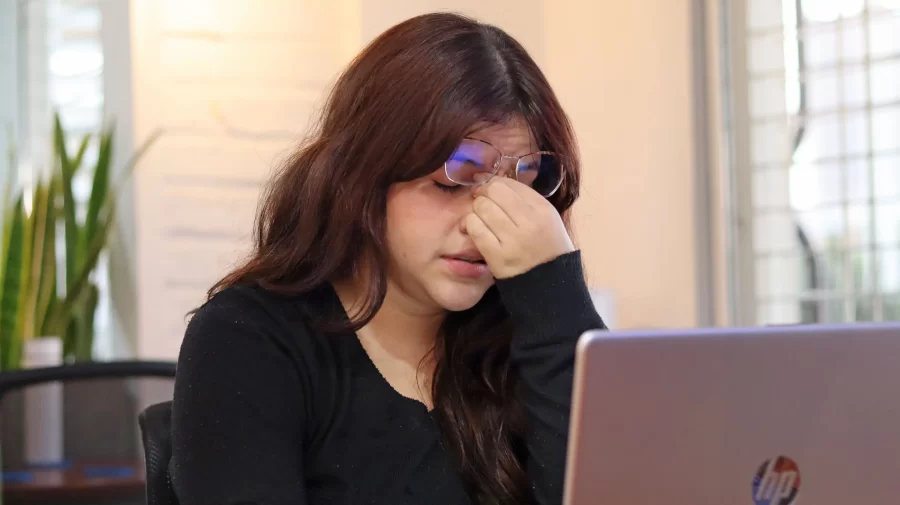It is not easy to go through the world without feeling negative or unpleasant emotions. Sometimes, we learn to walk the path we need to be on while ignoring those feelings. It’s not the most efficient or emotionally intelligent protocol, but it gets us by.
It gives us an illusion of functionality since we believe that getting through the end of the day with a shorter to-do list is good enough. Our well-being is interrupted by our occupations; most of the time, we might even prefer it that way.
Saying that we have no time to deal with pain or anguish is a fair excuse not to think about our lives. It is an excuse not to take responsibility for changing or facing reality.
We all want the job to be perfect, but it is usually far from that. We work and overwork ourselves at the expense of our youth, energy, or determined-to-succeed personality. Aspirations are nothing wrong but shouldn’t be a menace to your health.

Feeling anxious is not always pathological; it is a normal response of our bodies to a situation we might perceive as threatening. Anxiety at work is increasingly common, affecting individuals’ daily lives and work performance, highlighting the need for effective coping strategies and awareness of its impact.
Today’s world can be scary sometimes. We run against the clock, try to be as productive as humanly possible, and a little more, we are used to instant gratification and, therefore, frustrated more quickly when things are not going our way instantly. We know it is nothing but hard to stay stoic.
But do you know it? Sometimes, we are so immersed in a situation that we might not see it. Are fish aware they are in the water? So, here we have a couple of subtle signs to help you pick up on those anxious signals—nothing better for prevention than awareness.
Are You Feeling Tired But Wired?
Have you ever had one of those days where you didn’t get enough sleep, but somehow you feel energized and active? You could be bouncing off the walls or running on a different battery you didn’t know you had.
You are full of energy. You feel alert, but at some point, your system powers off. Whether you zoned out in the middle of the day or felt like you touched your bed and blacked out when you got home, you feel exhausted. You have to be careful because that can easily lead you to burnout.
Feeling drained but hyper-alert can be a subtle sign you may be anxious at work, indicative of work anxiety symptoms such as inability to concentrate, lack of motivation, decreased performance, strained working relationships, and increased sick leave.
Anxiety uses a lot of energy; we worry and have lots of things going on mentally. On top of that, it puts our bodies in an active state, as if we are ready to “fight or flight” at any moment, which is draining.
We have all these mechanisms to protect ourselves from different threats. We are designed to perform them. But they are meant to be used occasionally; when anxiety strikes a specific environment, like work, we can experience it for long periods, which is not healthy, and later on, will come to remind us that.
Do You Get Startled Easily?
Some people are likelier to drop a spoon if there is a sudden sound in the kitchen. This is not about general clumsiness. However, in some cases, clumsy people might feel anxious, too.
This is about that tension built up inside you, which might be exteriorized at any given moment with little to almost no stimuli. This tension can make it difficult to relax and can make it hard to focus on your work.
Being constantly on edge can often be a result of chronic stress from work, which keeps you in a perpetual state of heightened alertness, even in environments where it’s unwarranted.
Being constantly on edge is a sign of anxiety. Think of it as if you are in survival mode but at the office where no tiger is running towards you. It is like you’re constantly bracing yourself for something terrible to happen or always on the verge of a panic attack.
Someone is coming into the office and saying hi! It can make you jump if you weren’t expecting them. Think about whether what startled you is justified or if something triggered you.
Are You Getting Sick More Often?
Mind and body are undeniably linked. An imbalance in our lives can cause physical symptoms that can’t be explained otherwise. This is called somatization; it is standard to experience some physical symptoms expressing psychological or emotional factors.
Perhaps you are having headaches more often, some back pain even though you take care of your posture, or maybe you are constipated and have some newfound stomach issues, although your diet is the same as always.

If you have underlying health issues, like migraines or so, you might not be surprised to get a headache on a busy work week. That is okay; let’s not become paranoid and associate every ache with an emotional source. Instead, let’s try to be aware of our bodies.
Your body asks for what they need; sometimes, you need to listen. If there are some new aches that you can’t sort out, stop; it is your body asking you to hear.
When your car starts to sound weird, you stop, check the engine light, and look to see what happens. The same logic applies to your body since the sound is a sign of alert that something might be happening. Listen to it carefully.
Are You Prone To Negative Thinking?
Sure, we all think negatively without being anxious, but we should consider the ratio in which this happens. It is not expected nor healthy to obsess about the details of your work and the many ways you can screw it up.
When you are anxious, you may think you’re not good enough or will fail. Your inner dialog becomes a little hostile to you. You might even spend the day ruminating on these unkind words.
These negative thoughts can be very damaging and make it difficult to feel confident and motivated. When you are working on a project, and somehow, these clouds come your way, they can take your sunshine away.
Anxiety can also lead to self-doubt and fear and can make it difficult to take risks. Perhaps you won’t go for it on that upcoming project that needed volunteers to build a brand. Maybe you start holding yourself back because you are afraid of failing, so you instead do not try.
Having negative thoughts doesn’t mean you have an anxiety disorder, but when those thoughts get out of hand, you need to do something about it. Please pay close attention and be strong enough to say, this is not helping me; I need to find another way.
Persistent negative thinking may be a sign of an underlying anxiety disorder or depression, which can lead to chronic worrying, impact daily tasks, and affect relationships.
Do You Avoid Social Interactions At Work Due To Workplace Anxiety?
Whether your work anxiety is associated with performance, workplace stress, or specific clients and projects, people can be triggering, and we might opt to avoid them altogether. You may dread going to work or avoid social situations with your co-workers or clients. They could feel like the problem or an important factor that stresses you out.
This is because anxiety can make it challenging to socialize and can make you feel self-conscious. Perhaps you are anxious that anyone might ask about your progress on a stressful project.
You may also avoid work-related tasks that you find stressful or anxiety-provoking, negatively affecting your job performance. Avoiding these tasks and interactions can decrease productivity and employee engagement, ultimately impacting your ability to perform well at work. This can lead to work problems and make advancing your career difficult.
As subtle or loud as these signs sound to you, anxiety is pretty common nowadays. We have much more information available about mental health and encourage employees to be mindful of those issues.
With time and professional help, we learn to translate all that info into real-life applied knowledge and let them be what they were meant to be… prevention tools. So, If you identify with what we stated before, we have some tips you might want to try to deal with those anxious feelings.
Identify What Triggers You And Develop Coping Strategies
Knowing what makes you anxious, especially in the context of work-related anxiety, is the first step to changing it. Identifying triggers is essential for managing work-induced anxiety-related stress, as self-awareness is the key to most things, including staying healthy in a work environment. Ask yourself, what are the things that seem to make my anxiety worse, particularly at work?
Once you know your triggers, you can develop strategies for avoiding them or coping with them when they occur. For example, if you get anxious in meetings, you could try to sit near the door to excuse yourself if you start to feel overwhelmed quickly.
Take Breaks During The Day
It might sound simple, but it can work some miracles. Disconnecting from the source of stress and catching a breath is healing for most people. Get up and move around, or step outside for some fresh air. Taking breaks can help to reduce stress and anxiety.
Even a short break can help clear your head and return to your work feeling refreshed. It is an excellent way for you to restart with a calmer perspective, and perhaps it will be helpful to dissipate the negative self-talk since you could interrupt it with a break.
Establish Healthy Habits
Let’s be honest; some of our problems can magically disappear by maintaining healthy habits. Eating healthy, exercising, and getting good sleep is underrated. When you’re well-rested, you’re better able to cope with stress.
It is like magic; it cooperates once you give your body what it needs. When you care for a pet, they show affection and treat you well. The same happens when you take care of yourself. Your body responds with the help you need to feel better.
Emphasizing the importance of getting adequate sleep is crucial, as it is a cornerstone of maintaining healthy habits that support managing work anxiety effectively.

Seek Help From A Mental Health Professional
If you feel like those signs might represent how you are feeling and that maybe you are indeed experiencing anxiety, consulting with a mental health professional is crucial. Recognizing and treating any mental health condition, including anxiety, is essential for your well-being.
Work is only one place where your anxiety might be manifesting. If there is another area in your professional life where you may be having trouble because of those anxious feelings, let us tell you that you don’t have to stay like that.
Individuals with a diagnosed anxiety disorder are entitled to rights and accommodations under the Americans with Disabilities Act (ADA) to support and manage their work life.
Help is available for you, and there’s nothing wrong with looking for it. Resources are for use, so make the most of the ones you have. You might need to talk to a professional about it to help you better understand what is going on and how to cope with it best.
We are part of today’s workforce but were also part of a global pandemic, a particular family, and education. Everything shaped us into who we are, and no one can blame you for being a little anxious in today’s craziness.
The first step is to know what is happening in daily life, stop justifying things that don’t feel right, and work towards changing them once you do. We are here for you. Are you willing to take the first step?
See more articles by Laura Navarro.






